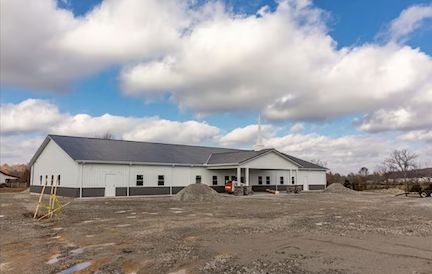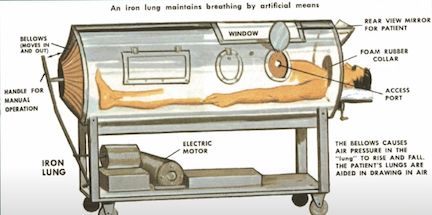Is Jesus home?
Church construction projects are (or at least used to be) a pretty common site, with one springing up on practicually every major road or in every large or small community. As you'd drive by from day to day, you'd watch as the foundation was laid, the walls went up, then the roof, and finally the spire. Not long after, you'd see the cars filling the parking lots and the people coming to inhabit the new edifice.

Several years ago, our church bought a nearby tract of land and began building a much larger sanctuary. In the center of the altar of the new church was a 30-foot-tall obelisk with a cross carved in it. Because of the obelisk's size, it was the first thing installed, and the church had to be built around it. We had to drive by the construction site on the way to the old church.
One day, after the walls were up but the building was not yet completed, my six-year-old daughter looked out the car window at the project. She then turned back and asked, "Has Jesus moved in yet?"
It is a probing question for those who seek forgiveness and grace. Has Jesus moved into your heart yet?
And the corillary akin to it: Does Jesus inhabit the ediface you've so carefully and systematically constructed?
John 6:35–40 (NRSV/ESV-friendly)
“Jesus said to them, ‘I am the bread of life. Whoever comes to me will never be hungry, and whoever believes in me will never be thirsty… This is the will of my Father, that all who see the Son and believe in him may have eternal life, and I will raise them up on the last day.’”
We must ask ourselves, concerning not just our church buildings, but of our own hearts, Does Jesus abide here?
"Here I am! I stand at the door and knock. If anyone hears my voice and opens the door, I will come in and eat with that person, and they with me" (Revelation 3:20, NIV).
God IS Our Environment
An observation exists out their on the internet, in various versions, and with various attributions. It is worth repeating, and it goes something like this ...
When God wanted to create fish, He turned to the sea. When God wanted to create trees, He turned to the earth. But when God wanted to create man, He turned to Himself. Then God said, “Let Us make man in Our image and in Our likeness.”
If you take a fish out of water, it will die; and when you remove a tree from soil, it will also die. Likewise, when man is disconnected from God, he dies.
Conversely, water without fish is still water, but fish without water are nothing. Soil without trees is still soil, but a tree without soil is nothing. God without man is still God, but man without God is nothing.

It continues,
God IS our natural environment. We were created to live in His presence. We have to be connected to Him because it is only in Him that true life exists. And in plugging into Him, he grants us dominion over all else.
"Then God said, 'Let us make man in our image, after our likeness. And let them have dominion over the fish of the sea and over the birds of the heavens and over the livestock and over all the earth and over every creeping thing that creeps on the earth'” (Genesis 1:26, ESV).
"And he made from one man every nation of mankind to live on all the face of the earth, having determined allotted periods and the boundaries of their dwelling place, that they should seek God, and perhaps feel their way toward him and find him. Yet he is actually not far from each one of us, for 'In him we live and move and have our being’; as even some of your own poets have said, 'For we are indeed his offspring’" (Acts 17:26-28, ESV).
"I am the vine; you are the branches. Whoever abides in me and I in him, he it is that bears much fruit, for apart from me you can do nothing" (John 15:5).
The Holy Spirit Is Our Iron Lung
According to the WHO,
Polio is a highly infectious disease that attacks the nervous system and can lead to ... respiratory paralysis, and in some cases death. ...
In the late 19th and early 20th centuries, frequent epidemics saw polio become the most feared disease in the world. A major outbreak in New York City in 1916 killed over 2000 people, and the worst recorded US outbreak in 1952 killed over 3000.
Many who survived the disease faced lifelong consequences. Deformed limbs meant they needed leg braces, crutches or wheelchairs, and some needed to use breathing devices like the iron lung, an artificial respirator invented for treatment of polio patients.
By the mid-20th century, the poliovirus could be found all over the world and killed or paralysed over half a million people every year. With no cure, and epidemics on the rise, there was an urgent need for a vaccine. ...
[It was not until] the early 1950s, the first successful vaccine was created by US physician Jonas Salk.
That vaccine came too late for Paul Alexander.
Sky News reports:
Paul Alexander, widely known as "Polio Paul," contracted the viral disease [Polio] in the summer of 1952 when he was six years old and was left paralysed from the neck down. He was rushed to hospital in Texas - and woke up inside the metal cylinder where he would spend the rest of his life. ... An update on his GoFundMe page by its organiser Christopher Ulmer reads: "Paul Alexander, 'The Man in the Iron Lung', passed away yesterday [March 11, 2024].

An iron lung is a type of negative pressure ventilator (NPV), a mechanical respirator which encloses most of a person's body and varies the air pressure in the enclosed space to stimulate breathing. It assists breathing when muscle control is lost, or the work of breathing exceeds the person's ability.
Polio Paul, as he was known, became literally dependent upon a machine -- an "iron lung" -- to act as a giant bellows, raising and compressing his chest -- every day of his life, for 72 years! -- to move life giving air in and out of his lungs. Without it, he was helpless, and would ultimately be lifeless.
The Greek word, pneuma occurs hundreds of times in the New Testament. It can mean "breath" or "wind" or "spirit." In context, it is most frequently used to refer to the Holy Spirit – the Third Person of the Trinity – who regenerates the believer unto newness of life, and then takes up residence and dwells within, sealing the believer for the day redemption (Ephesians 1:13-14). At the moment of salvation, the Lord literally "breathes" new life into us "through the washing of regeneration and renewing of the Holy Spirit" (Titus 3:5) causing us to be "born again" (John 3:5).
The Holy Spirit is to our spiritual lives what that Iron Lung was to Mr. Alexander. We can no more live spiritually without His life-giving power than Polio Paul could live without his Iron Lung. Without Him, we are helpless, and would ultimately be lifeless.
"Then the Lord God formed the man of dust from the ground and breathed into his nostrils the breath of life, and the man became a living creature" (Genesis 2:7, ESV).
"The Spirit of God has made me, and the breath of the Almighty gives me life" (Job 33:4, ESV).